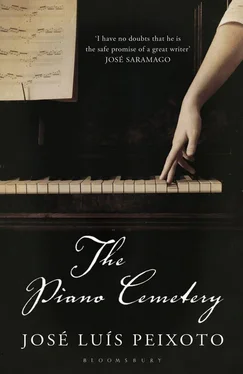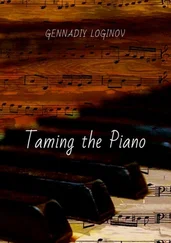Then there was a moment when I would put my right foot down by the front step of the house, on the pavement stones. And I would walk against the streets. I would get closer. And the streets would walk against me. When I reached the boarding house I knew for sure that inside was her. Her her her. This simple certainty was filled with miracles and I was almost surprised not to find the walls of the boarding house engulfed in flames, or filled with what seemed like a flood of magnificent voices. My waiting then was serene. I knew there was nothing that time could do against our inevitable, insatiable, indomitable will. There were breezes that came from black corners of the night and that touched my face. There was that nocturnal summer. I waited, and in a single moment: her steps on the other side of the wall, my heart lost inside me, her movements drawn in the silence, and me lost inside myself. And, in a single moment: her, at last, the weight of her body being much more than just weight, her, the shape of her body being much more than just a shape, at last, me feeling almost ready to cry, and her, at last, her body being much more than just her body, at last, in my arms. Her head resting on my shoulder. Her hair touching my cheek.
On those nights, I already knew that the woman who lived in the boarding house wasn’t her mother. The woman who ordered her about, whose face was stone, was her godmother. She had raised her from very young, as though she were her mother, as though she were her daughter. Her real, distant mother was the dull image of a poor woman, with a sad expression, locks of hair falling down her face. The first nights we walked, we ran far, before we embraced. Later we stopped being able to wait. We embraced as though exploding when we met, and only then we walked, we ran. For a week we had a park bench and we had all the shadows that shrouded it. Then, we had my key opening the big workshop door, the darkness and the piano cemetery. Our bodies.
‘Marta has asked me to go and spend the weekend at her place,’ my wife says. She repeats.
Maria remains silent.
Íris has woken up and got out of bed on her own. She is coming along the hall runner, her face cross with sleep. Her eyes almost closed. Her eyebrows as though she is angry. Her skin warm from the flannel sheets. She comes whimpering a lament which is her way of complaining at having woken up.
‘Oh! Come here to Mummy!’ says Maria, reaching her arms out to her.
Íris rubs her little eyes with her small hands, her fingers closed in her small hands. She whimpers, as though everyone believes and understands that waking up is a bad thing that has happened to her.
Maria takes her on her lap. She sits her on her knees. She examines her bandaged hand. She tells her she has to behave herself well. She talks to her about the little hurt. And she falls quiet. There is silence.
Her voice faint, but looking directly at her mother, Maria says:
‘Don’t go. .’
My wife remains silent.
Íris, sitting on her mother’s lap, has her gaze directed at the window and she continues to wake up, slowly. My wife is turned towards the sink. Her movements are too small to fill the kitchen.
‘Don’t go. .’ Maria says. She repeats.
Maria puts Íris down on the floor. She approaches my wife’s back and touches her arm. My wife pretends not to feel it. Maria says:
‘Please.’
My wife has already decided that she’s going to spend the weekend at Marta’s house, but she remains silent. Without knowing what she wants, Íris pushes a chair across the tiles. Maria shouts:
‘Stop that!’
With that shout, Íris begins to cry. Maria continues talking to her mother:
‘Please, I’m afraid that the worst is going to happen today.’
My wife remains silent.
The kitchen clock — in a few minutes Maria will have to go out, back to the factory. When she crosses the threshold my wife, ever silent, will have begun to give Íris spoonfuls of soup. Maria will go down the stairs, she will find the street, the light, the size of the buildings, the motorcars, July, the abandoned mangy dogs, and, the whole way, she will feel regret, pity and fear.
Our bodies. In the piano cemetery the night was black, it was absolute. In this opaque time, our bodies existed. My arms saved themselves, surrounding her. My hands sought peace in the sure surface of her back. Our lips knew how to meet. Our mouths constructed shapes — so many details — shapes that no one in the history of the world could imagine, they were impossible to imagine for living people with the common thoughts of people, unrepeatably concrete shapes. Our lips. Our tongues sensing the taste of our mouths — the warm saliva, the warm blood. And my lips extended. And my lips reached out to the skin of her face. I held her head — my fingers in her hair — and my lips mixed in the skin of her face. The palm of my right hand went down her body, down the line of her body, passed her waist and went down, trying to find the end of the dress, found her legs and moved up. It went up, on the inside of her thighs. And my lips were still there and on her lips too because we breathed the same breath. The tips of my fingers slipped up the warm, smooth inside of her thighs. This way was a long one. She put a hand around my arm. The tips of my fingers slipped and, the moment I touched the cotton of her panties, I felt her hand tighten around my arm and, still, we breathed the same breath. My fingers, squeezed by her legs, felt, slowly, the middle of the cotton panties, soft beyond the cotton, hot beyond the cotton. The palm of my hand, on the panties, felt the hairs under the panties. My fingers — my whole body — my fingers felt, slowly, the cotton, hot, damp. Our bodies drawn black on black. A piece of the dark night sky came in through the window of the piano cemetery. It was this almost no light that showed the shadows and the outlines of her body at the moment when I lifted her dress above her waist and slipped her panties down her legs. And I lay her on a piano — her body — my body — our bodies.
At the end of the summer, we learned that it was that night that we had made Marta.
September. As though preparing to cross autumn together, we were less and less able to bear the pain of parting. More and more people came to the workshop asking for jobs that were not ready. Every time I excused myself with my uncle’s disappearance — most expressions changed to understanding — but I knew the real reason was the vital urgency of always meeting her.
I had closed the workshop door and I had run through the invisible streets of Benfica. When I reached the market, I knew where to find her. I began to walk beside her, or behind her, or in front, far enough that, occasionally, our elbows would touch, that I would feel the smell of her skin, far enough that no one would understand that we were together. She would look one way, and I would feign no interest in looking that way. She asked the cost of the apples, I asked the cost of the pears. Trying not to move our lips, barely looking at one another, we exchanged whispered phrases — simple phrases that tried to say love — like questions, like answers. That morning I spoke furtive phrases to her, and she remained silent and serious. I would say something else to her — a smile expecting a smile — and she remained silent. In an instant she turned towards me, stopped, looked me in the eye — serious — and said that she was pregnant.
I don’t know where the whole world went.
After we said goodbye I walked, lost, wordless, in the hubbub of the market, until in silence we met at the corner before the boarding house, at lunchtime. She said:
‘I have to tell my godmother.’
I said nothing. She said:
‘I’d rather tell her before she notices.’
Читать дальше












